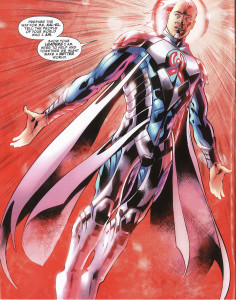WARNING: This is a spoiler concerning JLA: Justice League of America #2, just out this past July from DC Comics.
 So, immediately on the heels of JLA: Justice League of America #1‘s last-page surprise that Superman’s Kryptonian god Rao has come to Earth, issue #2 provides a full look at the supposed divinity and offers his directives.
So, immediately on the heels of JLA: Justice League of America #1‘s last-page surprise that Superman’s Kryptonian god Rao has come to Earth, issue #2 provides a full look at the supposed divinity and offers his directives.
“Prepare the way for me, Kal-El. Tell the people of your world who I am.”
Rao sounds much like the voice of the Abrahamic God as chronicled in such places as Mark 1:2-3: “As it is written in Isaiah the prophet: ‘Behold , I send my messenger ahead of you, who will prepare your way; the voice of one crying in the wilderness, “Make ready the way of the Lord, make His paths straight.”‘”
In that case, then, Superman/Kal-El is Rao’s John the Baptist (or, depending on your reading of the scripture, perhaps Isaiah). At the same time, if Rao is going to speak through Superman with his “way,” then Kal-El could have a (thoroughly un-Islamic) Mohammed-like role.
It could also make Kal-El Moses, depending on one’s translation of Exodus 3:13-14, namely: “Then Moses said to God, ‘Behold, I am going to the sons of Israel, and I will say to them, “The God of your fathers has sent me to you.” Now they may say to me, “What is His name?” What shall I say to them?’ God said to Moses, ‘I AM WHO I AM’; and He said, ‘Thus you shall say to the sons of Israel, “I AM has sent me to you.”‘” And a number of writers would be thrilled to have Superman represent Moses instead of Jesus.
Continue reading Who Gods the God/Men?, Part II (Or, Prepare Ye the Way of the Rao)


